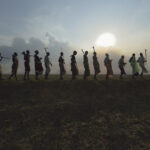COP 26 is now taking place. Stakeholders are attending the event with the conviction that we can no longer accept perennial denial of the real impact of climate change on the planet and humanity. It is time now to take bold and proactive actions to reverse the collective societal moral and political failure to address climate change in all its dimensions.

As the head of the ACT Alliance, one of the co-chairs of the UN Multifaith Advisory Council and a permanent observer member of the COVAX Facility governance structure, I want to highlight my perspective through different prisms.
Holistic response needed
Climate change represents the most complex challenge of our time – it requires a concerted, proactive and holistic response. It is happening as we face a global epidemiological crisis, which is exacerbated by structural inequalities and discriminations in our societies.
Even when there is plenty of evidence of the impact of climate change on people, as well as the effectiveness of COVID-19 vaccines, we still see people and governments denying both. We see religious leaders appealing to governments to commit to ambitious targets at the upcoming UN climate conference. For them, care for the environment is a moral imperative to preserve the planet for future generations and to support communities that are most vulnerable to climate change. On the other hand, we also see some religious leaders at the forefront of denial of vaccination against COVID-19.
COVID-19 lessons relevant to the climate crisis
I believe that is worthwhile to mention research in the Lancet (https://www.thelancet.com/), where experts in vaccine hesitancy provided three key lessons in risk communication to successfully maintain public support. These can also be applied to policies designed to cut carbon emissions quickly and substantially.
- The first key lesson is that the public must not be forgotten during the rapid transition to net-zero carbon emissions. Just as every vaccine that remains in the vial is 0 per cent effective, every green technological breakthrough is similarly useless in getting to net-zero if it remains unutilized.
- The second key lesson is to identify and support trusted messengers. Whether it is a call to vaccinate against COVID-19 or a call to reduce meat consumption, if it is to be heard and acted upon, the source of such a message first needs to be trusted.
- The third lesson is that if your message is not being heard, then humanize the data.
Impacts of both crises
The differentiated and intersectional impacts of both crises become more glaring when we zoom into specific issues such as gender equality, migration and displacement, and peace and human security. We must link the epidemiological crisis to the equally urgent climate crisis. The climate crisis presses climate-vulnerable countries to the edge as they face major climate-induced disasters and other hazards in addition to their ongoing COVID-19 response, prevention and recovery efforts.
There is a growing body of evidence showing that women, in all their diversity, are generally more vulnerable to the negative impacts of climate change than their male counterparts. Efforts to tackle gender inequality can play a key role in how countries adapt to the growing risks posed by climate change.
Many humanitarian catastrophes around the world are increasingly related to climate change, and it is a key driver of poverty and an inhibitor for sustainable development. It causes loss of lives and income, and damage to property, which in turn causes population displacement and conflicts. Our work should be connected more closely with disaster risk reduction, strengthening community resilience, livelihoods and climate change adaptation as well as compensation for loss and damage and climate-induced migration.
We have a very narrow window of opportunity to prevent the worst impacts of climate change. Climate action is not something that can be delayed for 5, 10 or 20 years. We must take urgent and ambitious action now.
Rudelmar Bueno de Faria (Brazil) is the General Secretary of the ACT Alliance. Mr Bueno de Faria has over 25 years of experience working with national and international religious and church-related organizations on humanitarian, development and advocacy programmes. From 2014 to 2017 he served as the World Council of Churches Representative to the United Nations. Rudelmar is the co-chair and member of the United Nations Multi-Faith Advisory Council, member of the UN Steering Committee for the Implementation of the Plan of Action for Religious Leaders and Actors to Prevent Incitement to Violence, member of the UN High-Level Commission of the Nairobi Summit on ICPD25 Follow-up, and a member of the AMC Engagement Group of the COVAX Facility.